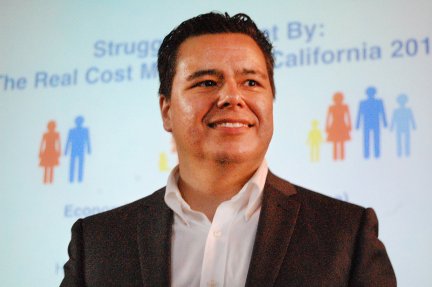Labor & Economy
ACLU Forum Asks: What’s Next After $15?
“What’s Next After $15?” a forum recently held by the American Civil Liberties Union’s Pasadena chapter, brought together community organizers and antipoverty activists to discuss the challenges now faced by the City of Roses to implement its new living wage law.

Activist Pablo Alvarado (left) and new Pasadena City Manager Steve Mermell (Photos by Bill Raden)
“What’s Next After $15?” a forum recently held by the American Civil Liberties Union’s Pasadena chapter, brought together community organizers and antipoverty activists to discuss the challenges now faced by the City of Roses to implement its new living wage law. Last March, Pasadena became one of only four California cities to pass a minimum wage ordinance that puts it on track to reach a $15-per-hour target by 2020. Los Angeles passed its own version in 2015. The workers of both cities will incrementally reach $15 a full two years before the statewide minimum wage law signed in April by Governor Jerry Brown. The first $10.50 tier of the Pasadena ordinance took effect July 1.
Speakers at the forum, held on the campus of the Neighborhood Unitarian Universalist Church, focused on outreach programs designed to inform Pasadena workers and employees of the new wage, while they also speculated about what kind of enforcement mechanism the city will employ to back it up in the face of the chronic wage theft that already disproportionately victimizes low-wage workers. Participants included Pablo Alvarado, director of the National Day Laborer Organizing Network and the Pasadena Community Job Center, which was a key leader in the broad-ranging coalition that persuaded the City Council to act; representing the city was Pasadena’s newly confirmed City Manager Steve Mermell, who will oversee the city’s outreach and enforcement efforts.
The event kicked off with a report from the United Ways of California’s manager of Program and Policy Development, Henry Gascon, on just how harrowing the reality of poverty in the state remains. Gascon presented findings from Struggling to Get By: The Real Cost Measure in California 2015, the groundbreaking study that he co-authored and which effectively redefined the true poverty line in the state.
The study’s overwhelming finding, he told the gathering, was that for most California cities, which have some of the priciest housing costs in the country, the official federal poverty line is absurdly unrealistic. In 2015, for example, while the Department of Health and Human Services had calculated the poverty line for a family of four at $24,250, the Real Cost study calculated that the same family, living in Los Angeles, would need to earn well over twice that amount to get by.
“There’s a gap of $28,000 these households don’t have to meet the basic needs of life,” he said. “It continually boggles my mind in terms of how these low-income families are even managing to stay under a roof. The math does not compute.”
It was the real-life stories behind that kind of math, Alvarado said, that played a pivotal role in getting Pasadena’s $15 wage ordinance passed. The alt labor organizer credited the mobilization of the city’s low-income workers, many of whom, he pointed out, are undocumented, for the law’s passage.
“They were prime movers in this Fight for 15 in our city,” he declared. “It was those men and women who overcame their fear and came to the City Council and shared their stories. Because oftentimes workers are invisible … The lessons that people can teach us, on how people live earning minimum wage [were] part of what persuaded the political class in Pasadena to make the right decision.”
Alvarado, whose Pasadena Community Job Center will be partnering with the city to get the word of the new law out to low-income earners, also reminded the gathering that the ordinance was just the beginning of the living wage work. Without effective enforcement, he said, the minimum wage law is meaningless in a system that already makes recovering stolen wages virtually impossible for the workers he represents.
“The law is meant to protect the employers, not the workers,” he argued about the legal system in general. “The California Labor Commission, for example, has one investigator per county … But if you talk about the penal code, the infrastructure to enforce that is huge. And somehow our society has made the decision that it is more important to prosecute young men of color, who would steal candy in a local store, and not the employer who stole the wage of the workers.”
Mermell took the floor to detail Pasadena’s incremental rollout of the new wage, which could, upon review in 2019, reach $15 an hour in July of 2020. He also discussed how the city is grappling with designing its enforcement mechanism under the law, which requires city officials for the first time to aggressively prosecute employers over wage infractions.
“This is new to us,” he said. “Local government typically doesn’t enforce a minimum wage ordinance.”
But it was Mermell’s characterization of the city council as having supported the ordinance virtually “out of the gate” that exposed differences of opinion over the wage fight.
“I wish Steve would have told me two years ago that the council was ready to pass the minimum wage,” activist attorney Dale Gronemeier quipped. “It would have saved a thousand, two thousand hours of my time.”
-

 Latest NewsApril 10, 2024
Latest NewsApril 10, 2024The Transatlantic Battle to Stop Methane Gas Exports From South Texas
-

 Latest NewsApril 23, 2024
Latest NewsApril 23, 2024A Whole-Person Approach to Combating Homelessness
-

 Latest NewsMarch 27, 2024
Latest NewsMarch 27, 2024Street Artists Say Graffiti on Abandoned L.A. High-Rises Is Disruptive, Divisive Art
-

 State of InequalityApril 11, 2024
State of InequalityApril 11, 2024Dispelling the Stereotypes About California’s Low-Wage Workers
-

 Latest NewsApril 24, 2024
Latest NewsApril 24, 2024An Author Reflects on the Effort to Rebuild L.A. After the ‘Violent Spring’ of 1992
-

 State of InequalityMarch 28, 2024
State of InequalityMarch 28, 2024Los Angeles Hotel Workers Could Use the 2028 Olympics to Their Advantage
-

 Striking BackApril 12, 2024
Striking BackApril 12, 2024Organizing the Slopes
-

 Feet to the FireMarch 29, 2024
Feet to the FireMarch 29, 2024New Mexico Governor Vetoes Tax Break for Wells After Pushback





















